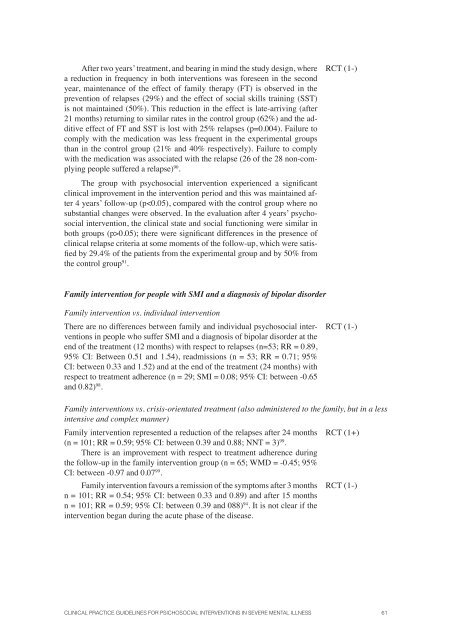CPG for Psychosocial Interventions in Severe Mental ... - GuÃaSalud
CPG for Psychosocial Interventions in Severe Mental ... - GuÃaSalud
CPG for Psychosocial Interventions in Severe Mental ... - GuÃaSalud
Create successful ePaper yourself
Turn your PDF publications into a flip-book with our unique Google optimized e-Paper software.
After two years’ treatment, and bear<strong>in</strong>g <strong>in</strong> m<strong>in</strong>d the study design, where<br />
a reduction <strong>in</strong> frequency <strong>in</strong> both <strong>in</strong>terventions was <strong>for</strong>eseen <strong>in</strong> the second<br />
year, ma<strong>in</strong>tenance of the effect of family therap y (FT) is observed <strong>in</strong> the<br />
prevention of relapses (29%) and the effect of social skills tra<strong>in</strong><strong>in</strong>g (SST)<br />
is not ma<strong>in</strong>ta<strong>in</strong>ed (50%). This reduction <strong>in</strong> the effect is late-arriv<strong>in</strong>g (after<br />
21 months) return<strong>in</strong>g to similar rates <strong>in</strong> the control group (62%) and the additive<br />
effect of FT and SST is lost with 25% relapses (p=0.004). Failure to<br />
comply with the medication was less frequent <strong>in</strong> the experimental groups<br />
than <strong>in</strong> the control group (21% and 40% respectively). Failure to comply<br />
with the medication was associated with the relapse (26 of the 28 non-comply<strong>in</strong>g<br />
people suffered a relapse) 90 .<br />
The group with psychosocial <strong>in</strong>tervention experienced a significant<br />
cl<strong>in</strong>ical improvement <strong>in</strong> the <strong>in</strong>tervention period and this was ma<strong>in</strong>ta<strong>in</strong>ed after<br />
4 years’ follow-up (p0.05); there were significant differences <strong>in</strong> the presence of<br />
cl<strong>in</strong>ical relapse criteria at some moments of the follow-up, which were satisfied<br />
by 29.4% of the patients from the experimental group and by 50% from<br />
the control group 91 .<br />
RCT (1-)<br />
Family <strong>in</strong>tervention <strong>for</strong> people with SMI and a diagnosis of bipolar disorder<br />
Family <strong>in</strong>tervention vs. <strong>in</strong>dividual <strong>in</strong>tervention<br />
There are no differences between family and <strong>in</strong>dividual psychosocial <strong>in</strong>terventions<br />
<strong>in</strong> people who suffer SMI and a diagnosis of bipolar disorder at the<br />
end of the treatment (12 months) with respect to relapses (n=53; RR = 0.89,<br />
95% CI: Between 0.51 and 1.54), readmissions (n = 53; RR = 0.71; 95%<br />
CI: between 0.33 and 1.52) and at the end of the treatment (24 months) with<br />
respect to treatment adherence (n = 29; SMI = 0.08; 95% CI: between -0.65<br />
and 0.82) 98 .<br />
RCT (1-)<br />
Family <strong>in</strong>terventions vs. crisis-orientated treatment (also adm<strong>in</strong>istered to the family, but <strong>in</strong> a less<br />
<strong>in</strong>tensive and complex manner)<br />
Family <strong>in</strong>tervention represented a reduction of the relapses after 24 months RCT (1+)<br />
(n = 101; RR = 0.59; 95% CI: between 0.39 and 0.88; NNT = 3) 99 .<br />
There is an improvement with respect to treatment adherence dur<strong>in</strong>g<br />
the follow-up <strong>in</strong> the family <strong>in</strong>tervention group (n = 65; WMD = -0.45; 95%<br />
CI: between -0.97 and 0.07 99 .<br />
Family <strong>in</strong>tervention favours a remission of the symptoms after 3 months<br />
n = 101; RR = 0.54; 95% CI: between 0.33 and 0.89) and after 15 months<br />
n = 101; RR = 0.59; 95% CI: between 0.39 and 088) 94 . It is not clear if the<br />
<strong>in</strong>tervention began dur<strong>in</strong>g the acute phase of the disease.<br />
RCT (1-)<br />
CLINICAL PRACTICE GUIDELINES FOR PSICHOSOCIAL INTERVENTIONS IN SEVERE MENTAL ILLNESS 61

















